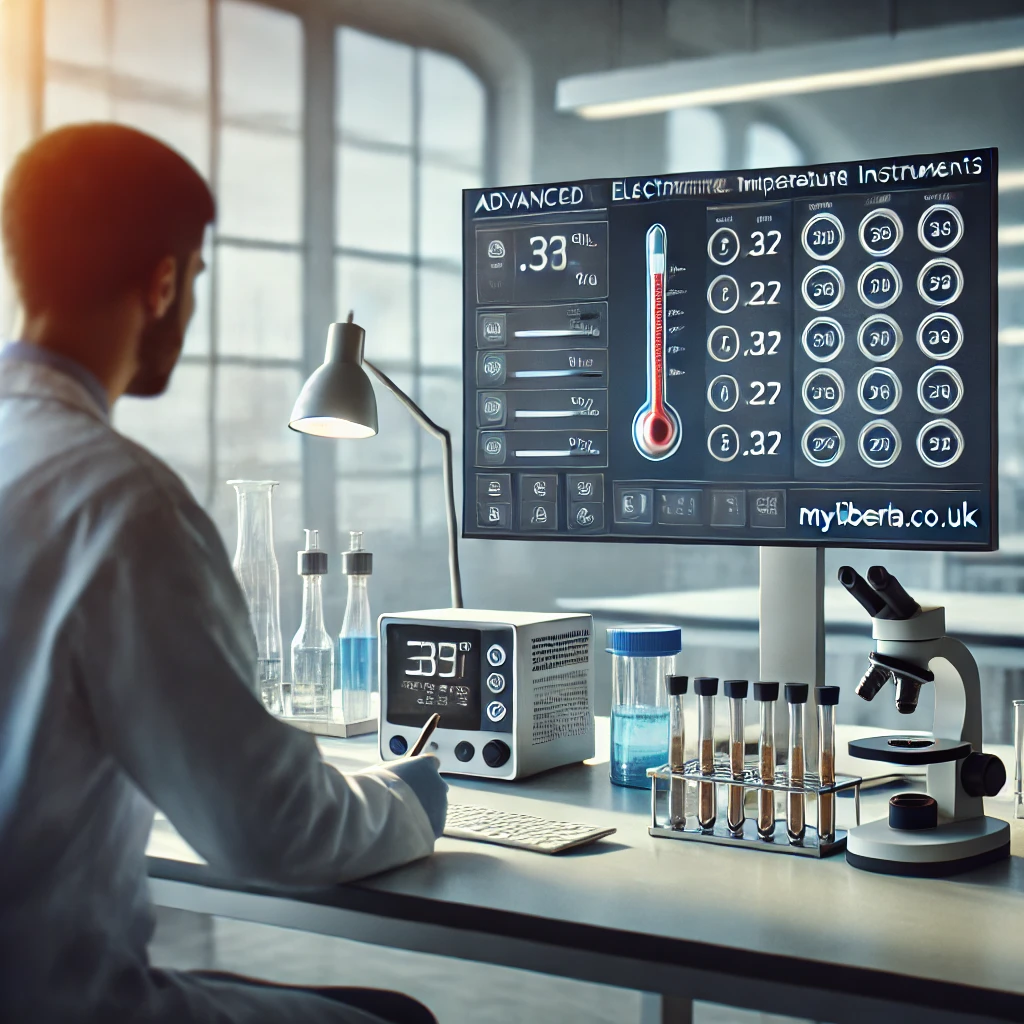ExploringElectronic Temperature Instruments University of Brighton
The University of Brighton has established itself as a hub for innovation, particularly in the field of technology. One of its standout areas of research and education is the development and application of electronic temperature instruments. These devices play a crucial role in various industries, from healthcare to environmental monitoring, making the University’s contributions highly impactful. The University’s emphasis on advancing these instruments has also helped in setting benchmarks for modern technological standards.

What Are Electronic Temperature Instruments?
Electronic temperature instruments are advanced tools used to measure and monitor temperature with precision. Unlike traditional thermometers, these devices rely on electronic sensors, such as thermocouples, resistance temperature detectors (RTDs), and thermistors, to deliver accurate readings. The data they generate can be analyzed in real-time, making them indispensable in modern applications. These instruments are pivotal in providing continuous monitoring, ensuring safety and quality across industries.
Electronic Temperature Instruments University of Brighton, At the University of Brighton, students and researchers delve deep into understanding how these instruments work and how they can be improved for various applications. The University’s state-of-the-art facilities provide hands-on experience with cutting-edge tools, ensuring graduates are well-prepared for technological challenges. Faculty members at the University regularly collaborate with leading tech companies to ensure the academic curriculum aligns with industry requirements, keeping students at the forefront of technological advancements.
Applications of Electronic Temperature Instruments
The applications of electronic temperature instruments extend across multiple industries. Some of the key areas explored at the University of Brighton include:
- Healthcare: Temperature monitoring in medical equipment, such as incubators and sterilization devices, ensures patient safety and the efficacy of medical processes.
- Environmental Science: Measuring climate variables for research on global warming and environmental conservation initiatives.
- Industrial Processes: Ensuring safety and efficiency in manufacturing plants by monitoring and controlling temperatures in real-time.
- Food Safety: Monitoring temperatures during storage and transportation to comply with safety standards and maintain food quality.
- Aerospace: Applications in extreme environments, such as spacecraft and satellites, where accurate temperature measurements are critical.
Electronic Temperature Instruments University of Brighton, Students and researchers at the University engage in projects that enhance the functionality and accuracy of these instruments, contributing to advancements in these sectors. For instance, collaborative research with environmental agencies has led to the development of portable devices that monitor temperature variations in remote areas.
Cutting-Edge Research at the University of Brighton
The University of Brighton is renowned for its research into the development of electronic temperature instruments. Recent projects have focused on improving sensor accuracy, durability, and energy efficiency in extreme environments. By collaborating with industry leaders, the University ensures that its innovations have real-world applications. This blend of theoretical knowledge and practical research empowers students to work on impactful projects.
Electronic Temperature Instruments University of Brighton, One notable project involved designing sensors for use in space exploration, where temperature monitoring is critical for ensuring the functionality of onboard equipment. This groundbreaking research highlights the University’s role in pushing the boundaries of technology. Another example includes advancements in medical sensors that help in early detection of diseases through precise temperature measurements, demonstrating the University’s commitment to contributing to society.
Learning Opportunities – Electronic Temperature Instruments University of Brighton
For students interested in technology, the University of Brighton offers courses that provide a solid foundation in electronic instrumentation. These programs emphasize practical learning, allowing students to design, build, and test their own electronic temperature instruments. The inclusion of internships and industry collaborations within the curriculum provides a well-rounded educational experience.
Electronic Temperature Instruments University of Brighton, Specialized workshops and seminars conducted by industry experts further enhance students’ understanding of electronic temperature instruments. These events provide insights into real-world challenges and opportunities, enabling students to bridge the gap between academic learning and practical applications. Additionally, the University’s focus on sustainable technologies ensures that students are equipped to address environmental and societal challenges through innovative solutions.
Why Choose the University of Brighton?
The University of Brighton stands out for its commitment to innovation and excellence. Its focus on electronic temperature instruments reflects a dedication to addressing modern challenges with cutting-edge solutions. By studying here, students gain access to:
- Expert faculty with industry experience who bring practical insights into the classroom.
- State-of-the-art laboratories and resources equipped with the latest technology.
- Opportunities for collaborative research with global organizations, enabling exposure to international standards.
- An emphasis on sustainability and ethical practices in technology, preparing students to contribute responsibly to the tech industry.
Electronic Temperature Instruments University of Brighton, Graduates from the University have gone on to secure prestigious positions in leading tech firms, contributing to advancements in temperature measurement technologies globally.

Conclusion – Electronic Temperature Instruments University of Brighton
The field of electronic temperature instruments is ever-evolving, and the University of Brighton remains at the forefront of this exciting domain. Electronic Temperature Instruments University of Brighton, Whether you’re a prospective student, a researcher, or an industry professional, the University’s contributions to this field offer valuable insights and opportunities. Its focus on innovation, practical application, and sustainability ensures that the advancements made here have a lasting impact. With its commitment to excellence, the University is shaping the future of temperature measurement technology and inspiring the next generation of innovators.
FAQ onElectronic Temperature Instruments University of Brighton
1. What are electronic temperature instruments?
Electronic temperature instruments are advanced tools that measure and monitor temperature with high precision. They rely on electronic sensors like thermocouples, RTDs, and thermistors to provide accurate and real-time temperature data.
2. Why are electronic temperature instruments important?
These instruments are crucial across various industries, including healthcare, environmental monitoring, industrial processes, food safety, and aerospace. They ensure accuracy, safety, and efficiency in critical applications.
3. What role does the University of Brighton play in advancing this technology?
The University of Brighton conducts cutting-edge research and offers educational programs focused on the development and application of electronic temperature instruments. Their projects aim to improve sensor accuracy, durability, and usability in extreme conditions.
4. What industries benefit from the research at the University of Brighton?
Electronic Temperature Instruments University of Brighton, The University’s research benefits industries such as:
- Healthcare (e.g., temperature monitoring in medical equipment).
- Environmental science (e.g., climate research).
- Industrial processes (e.g., manufacturing safety).
- Food safety (e.g., temperature compliance during storage).
- Aerospace (e.g., sensors for space exploration).
5. Can students work on electronic temperature instruments at the University?
Yes, students at the University of Brighton have access to state-of-the-art facilities where they can design, build, and test electronic temperature instruments. The programs emphasize hands-on learning and industry collaboration.
6. Are there any notable projects in this field at the University?
Yes, the University has contributed to projects like developing temperature sensors for space exploration and creating portable devices for environmental monitoring. These projects highlight the University’s focus on real-world applications.
7. What makes the University of Brighton’s approach unique?
The University’s approach combines theoretical knowledge, practical application, and sustainability. Students benefit from expert faculty, cutting-edge labs, and collaborative research opportunities with global organizations.
8. How can I apply to study at the University of Brighton?
Electronic Temperature Instruments University of Brighton, Prospective students can visit the University’s official website to explore programs, admission requirements, and application procedures. Specific courses focusing on electronic instrumentation are listed under the technology and engineering departments.
9. What career opportunities are available for graduates?
Graduates skilled in electronic temperature instruments find opportunities in diverse fields, including technology development, healthcare, environmental research, and aerospace engineering. The demand for such expertise is high in global industries.
10. How does the University address sustainability in this field?
Electronic Temperature Instruments University of Brighton, The University emphasizes sustainable practices by incorporating energy-efficient technologies in its research and teaching methods. This prepares students to address environmental challenges responsibly.
11. Can industry professionals collaborate with the University?
Yes, the University of Brighton actively collaborates with industry leaders to ensure its research has real-world relevance. Professionals can engage in joint projects, research initiatives, or knowledge-sharing events.
12. Where can I learn more about the University’s contributions to electronic temperature instruments?
Electronic Temperature Instruments University of Brighton, To learn more, you can visit the University of Brighton’s official website, attend open days, or contact their technology and engineering departments for detailed insights into their research and programs.


